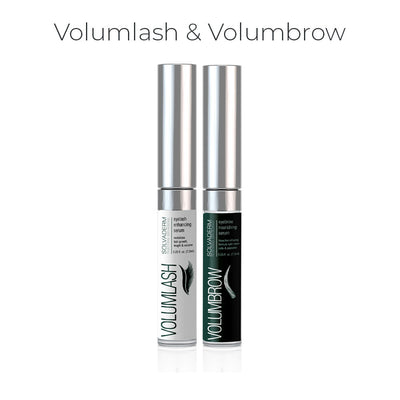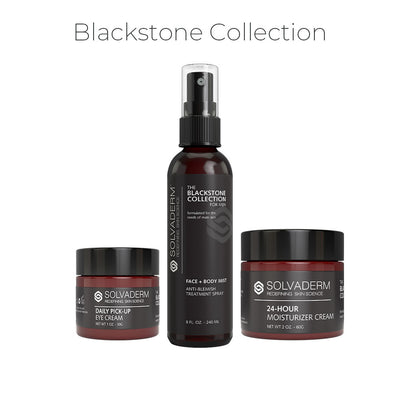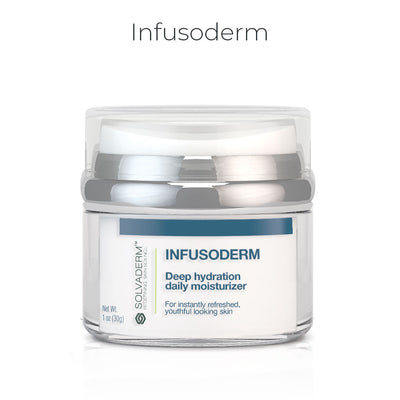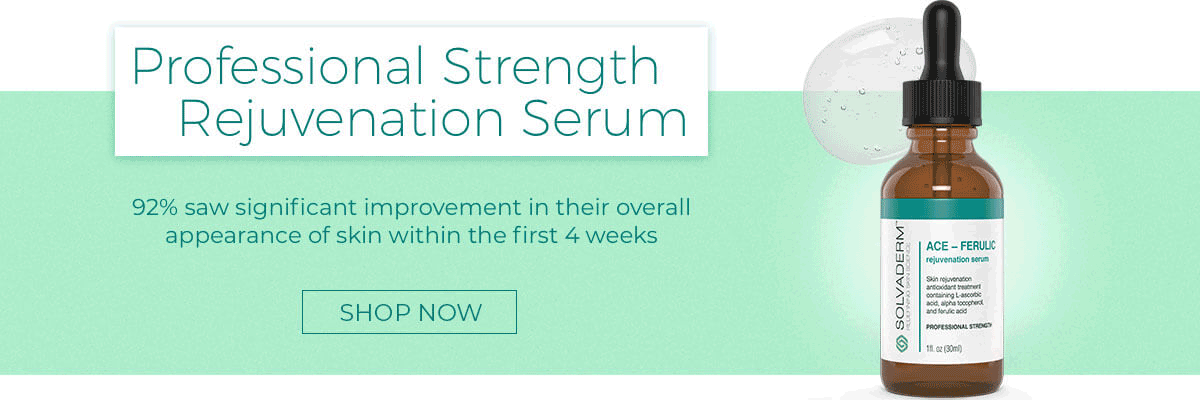Collagen degradation can begin as early as your mid-20s, and it declines at a rate of about 1% each year. In the 5 years following menopause, some women lose up to 30% of their collagen levels.[1]
However, there’s no real reason to be concerned about this data, because thanks to continuing innovations in the field of dermatology there are a number of highly effective interventions that can help you take control of your skin health, increase collagen production in the face, and prevent premature signs of aging.
In this article, we’ll describe how to restore collagen in the face, and we’ll also explain its properties, benefits, and some of the environmental factors that impact collagen production. Let’s take a close look at this youth-preserving protein.
What Is Collagen?
Collagen is the most abundant protein in the body, and it exists in particularly high amounts in the connective tissue, bones, skin, muscles, and cartilage.[2] High collagen levels in the body are essential for skin elasticity, joint health, wound healing, cartilage flexibility, and tissue structural support. In addition, if you want to know how to get smooth skin on the face, we can tell you that collagen is the best solution.
Following a healthy, nutrient-rich diet should ensure that you consume the raw materials required to promote collagen production. However, there are a wealth of collagen supplements on the market because they offer additional skin rejuvenation, anti-aging, hair, and nail health benefits.
Current scientific evidence regarding the benefits of collagen supplements is somewhat mixed, but studies show that a high-quality product can enhance smooth skin on the face, facilitate muscle repair, and support the integrity of the intestinal lining.
You may decide to take a collagen supplement if you are not getting enough of this protein through your diet, or if you have noticed signs of age like wrinkles and fine lines on your skin.
Why Your Collagen Levels Depletes With Age?
As we’ve said, collagen production starts to decline beginning in your mid-20s or early 30s as a natural biological process. However, there are other mechanisms that can contribute to collagen depletion. One study[3], for example, concluded that fibroblast aging and defective mechanical stimulation in skin tissue may contribute to reducing collagen production.
Fibroblasts are cells found across different organ systems, including the skin, and they both produce collagen proteins and promote cell regeneration and repair.[4] Fibroblast function declines with age, and with it, our capacity to produce collagen decreases. This may lead to signs of aging on the skin like wrinkles and fine lines.
Defective stimulation of the skin occurs when key mechanical signals do not convert into the appropriate biological responses. This may include failure to stimulate the extracellular skin matrix to produce collagen and inhibit collagen-degrading enzymes.[5]
Aside from the natural biological factors that contribute to collagen depletion, there are other external elements that can play a role. Some of these include smoking, poor diet, overexposure to ultraviolet (UV) radiation, excess alcohol consumption, and environmental pollutants.
What Happens When Your Collagen Levels Decline?
Collagen is responsible for keeping your skin elastic, and when levels drop, the resulting decline in elasticity may lead to signs of aging like fine lines, wrinkles, thinning, dullness, sagging, texture irregularities, and dryness.
In addition to the skin, there is also collagen in the muscles, bones, tendons, joints, hair, and nails. The reduction in levels as you age may cause issues like joint pain, decreased flexibility, weakened hair and nails, reduced bone density, and depleted muscle mass. According to the research, structural changes in collagen due to aging may even result in cardiovascular and respiratory problems.[6]
Why Do We Need to Restore Collagen?
Collagen is a vital protein, so replenishing declining levels is critical to preserving bone density and preventing joint stiffness, muscle weakness, and premature skin aging. Restoring collagen on the face may help significantly to tighten the complexion and smooth signs of aging like fine lines and wrinkles. Healthy collagen production is also essential for healing wounds, as it attracts immune cells and fibroblasts to the injury site to promote tissue function, growth, and repair.[7]
What Causes Collagen Loss?
Both intrinsic biological and extrinsic factors can lead to collagen loss. These are the primary contributors:
-
Aging: Over time, both fibroblast cell function and collagen production diminish. Your collagen levels begin to decrease in your mid-20s but decline more dramatically after 40.
-
Menopause: Menopause is a natural part of the aging process that can accelerate collagen and hyaluronic acid depletion. Dermatologists estimate that some women experience a 30% reduction in their collagen levels in the five-year period following menopause. This may ultimately result in signs of aging like fine lines, wrinkles, sagging, and dullness.
-
Sun Damage: Excessive exposure to the sun’s harmful rays can contribute to collagen breakdown. The UV rays penetrate deeply into the skin’s layers and damage the collagen and elastin fibers. The specific mechanisms that lead to collagen degradation and photoaging include the production of reactive oxygen species (ROS) and the downregulation of the growth factor pathways that promote collagen homeostasis.[8]
-
Poor Diet: Your body needs specific vitamins, minerals, and other building blocks to produce and support healthy collagen levels. For example, zinc, copper, and Vitamins A and C are collagen booster nutrients that can help prevent premature signs of age. Your body also needs sufficient amounts of the amino acids lysine, glycine, and proline to promote collagen production.[9]
-
Smoking: Research shows that smoking can contribute to premature skin aging by increasing levels of the enzyme metalloproteinase (MMP), which leads to collagen and elastin degradation. When it comes to the mechanism, smoking contributes to collagen loss[10] through the creation of ROS.
How to Increase Collagen in the Face?
These are some of our best lifestyle and skincare tips which should help you to significantly increase collagen in the face.
Boost Collagen With Vitamin C Serum: Incorporating a Vitamin C formula like the Ace-Ferulic Skin Damage Restoration Serum into your skincare regimen can protect your complexion from ROS and help stimulate collagen production.[11] The serum also includes other rich antioxidants like ferulic acid, Vitamin E, and niacinamide that can help you achieve healthy, radiant skin.
Add Retinoids: Retinoids are derivatives of vitamin A, and they really pack a punch when it comes to skincare benefits. Retinol stimulates the fibroblasts to increase the production of collagen, tightening the skin and reducing fine lines and wrinkles. Retinoids can also prevent water loss and strengthen the skin barrier.[12]
If you want to incorporate a retinoid into your anti-aging skincare routine, we highly recommend applying Suvoderm Retinol Night Cream every evening. In addition to retinol, it contains other beneficial bioactive skincare ingredients like niacinamide and hyaluronic acid, making it arguably the best treatment for deep wrinkles on the face.
Pack in Peptides: Peptides are chains of amino acids that help build collagen, so incorporating them into your skincare routine can increase its production and help you achieve smooth, firm, and youthful skin on the face.
Collagen peptides[13] also have antioxidant properties that help repair damage to the skin barrier and protect the complexion from harmful environmental agents like UV rays. Research shows that applying products with peptides is one of the best treatments for reducing deep wrinkles on the face.
One of our top picks when it comes to peptides is Replexagen Peptide Serum, which contains cutting-edge growth factors and peptides that revitalize the skin at a cellular level and provide long-term protection from aging.
Apply Sunscreen: Sunscreen blocks harmful UV rays and prevents them from breaking down collagen. In addition to degrading collagen, excess sun exposure can produce harmful ROS and contribute to other signs of photoaging like hyperpigmentation, broken capillaries, and uneven texture.
Don’t Smoke: Smoking can contribute to signs of aging because it increases the production of ROS and leads to collagen degradation. To prevent this decline, try to avoid cigarettes and other tobacco products.
Consider a Chemical Peel: Chemical peels are an optimal collagen booster because they increase skin cell turnover. The process involves the application of a formula that works to slough off the top layer of dead cells and repair the micro-trauma to the skin barrier through collagen and elastin production. Research[14] shows that regular chemical peels can help decrease hyperpigmentation, scars, and acne. They are also a great treatment for deep wrinkles on the face.
For potent exfoliation benefits with some of the same ingredients used in a chemical peel, we highly recommend adding the Glowpeel Dermal Exfoliating Serum to your anti-aging skincare routine. It contains key alpha hydroxy acids (AHAs) that gently exfoliate the skin, stimulate collagen production, and promote an even texture.
Keep Moving: Exercise is an underrated intervention for optimizing skin health. It’s a great collagen booster because it stimulates the fibroblasts to increase production. Physical activity also enhances blood flow and delivers oxygen and nutrients to the skin's surface for a healthy, radiant glow.
A 2023 study[15] on healthy, sedentary, middle-aged women found that resistance training decreased skin inflammation and enhanced dermal fibroblast activity for anti-aging benefits and improved elasticity.
Cut Back on Alcohol: Regular alcohol consumption can decrease the skin’s antioxidant capacity and accelerate the aging process, according to research[16]. This lowers its ability to protect against the free radicals that damage collagen and other structural proteins.
Get a Good Night’s Sleep: Getting enough good quality sleep plays a vital role in skin health, as most repair and regeneration occurs at night. One scientific study[17] found that chronic poor sleep habits increase skin aging and disrupt barrier function.
What Are the First Signs Collagen is Working?
Skincare products that boost collagen production can take up to 8 weeks to produce full results, depending on the individual formula. Signs that indicate that the product is working include firmer, smoother skin, reduced wrinkle depth, and a more vibrant appearance.
The quality of the skincare products you apply can also have a significant impact on the speed and efficacy of collagen synthesis. Ensure that you use formulas that contain ingredients backed by research, and choose a brand that has a proven track record of customer success.
In addition to the products we have already mentioned, Stemuderm Anti-Wrinkle Cream is a superior anti-aging formula that includes peptides, amino acids, hyaluronic acid, and other potent ingredients clinically proven to reduce fine lines and wrinkles, seal in moisture, improve skin elasticity, and restore collagen production in the face.
Frequently Asked Questions
These are some of the most commonly asked questions about collagen production.
What Depletes Collagen in the Body?
There are intrinsic and extrinsic factors that can deplete collagen levels in the body. The primary intrinsic factors include aging and menopause, as both involve reduced fibroblast function.
Extrinsic factors that can accelerate collagen depletion include stress, inadequate sleep, poor diet, and overexposure to the sun, smoking, excessive alcohol consumption, and environmental pollutants.
What is the Best Collagen Drink?
There are a number of collagen powders on the market, and most can be easily incorporated into smoothies, juices, or any other beverage of your choice. When you choose a collagen drink powder, check to ensure that it’s third-party tested for contaminants such as heavy metals or chemical additives. In addition, select a brand with collagen that is hydrolyzed, as it’s much easier for the body to digest and absorb.
If your primary goal is to restore collagen in the face, look for a formula that includes type I collagen. However, if you want a product that offers additional health benefits, choose a collagen drink that contains types I, II, and III.
Does Caffeine Destroy Collagen?
There is some evidence to indicate that drinking too much caffeine may negatively impact collagen production. One study[18] found that caffeine reduced collagen synthesis in human fibroblast cells by slowing the activity of the prolidase enzyme. If you want to prevent the adverse effects of caffeine on collagen synthesis, it’s best to consume it in moderation.
What is Collagen Made of?
Collagen is a protein that is made up of 19 amino acids, with the most concentrated being glycine, proline, and hydroxyproline. The amino acid profile of collagen can vary depending on its source.
Conclusion
If you’re wondering how to restore collagen in the face, begin by avoiding skincare and lifestyle habits that promote its depletion and incorporating products that increase its production into your routine.
Factors that can decrease collagen production include unhealthy lifestyle habits like poor diet, overexposure to the sun, excess alcohol consumption, smoking, poor sleep, and stress. You can restore collagen in the face by including products with Vitamin C, retinoids, peptides, and exfoliating acids in your routine.
In this article, we have also highlighted some of the highest quality, most effective formulas for boosting collagen production and decreasing the depth of deep wrinkles on your face. With our recommendations, you should be well on your way to a firm, youthful complexion free of signs of age.
References
1] ↑https://www.uclahealth.org/news/should-you-take-collagen-supplements
2] ↑https://www.hsph.harvard.edu/nutritionsource/collagen/
3] ↑https://www.ncbi.nlm.nih.gov/pmc/articles/PMC1606623/
4] ↑https://karger.com/spp/article/32/5/275/295956/Fibroblast-Growth-Factors-A-Controlling-Mechanism
5] ↑https://www.ncbi.nlm.nih.gov/pmc/articles/PMC4321566/
6] ↑https://pubmed.ncbi.nlm.nih.gov/28634008/
7] ↑https://www.ncbi.nlm.nih.gov/pmc/articles/PMC8151502/
8] ↑https://www.ncbi.nlm.nih.gov/pmc/articles/PMC4292080/
9] ↑https://www.hsph.harvard.edu/nutritionsource/collagen/
10] ↑https://pubmed.ncbi.nlm.nih.gov/17951030/
11] ↑https://www.ncbi.nlm.nih.gov/pmc/articles/PMC5605218/
12] ↑https://www.ncbi.nlm.nih.gov/pmc/articles/PMC6791161/
13] ↑https://www.sciencedirect.com/science/article/pii/S1756464621003297
14] ↑https://www.ncbi.nlm.nih.gov/pmc/articles/PMC2921757/
15] ↑https://www.nature.com/articles/s41598-023-37207-9
16] ↑https://www.ncbi.nlm.nih.gov/pmc/articles/PMC6715121/
17] ↑https://pubmed.ncbi.nlm.nih.gov/25266053/
18] ↑https://www.ncbi.nlm.nih.gov/pmc/articles/PMC4206198/










